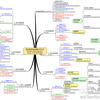Software development teams have to face stress caused by deadlines, staff turnover, or individual differences in commitment, expertise, and time zones. While students are typically taught the theory of software project management, their exposure to such stress factors is usually limited. However, preparing students for the stress they will have to endure once they work in project teams is important for their own sake, as well as for the sake of team performance in the face of stress. Team performance has been linked to the diversity of software development teams, but little is known about how diversity influences the stress experienced in teams. In order to shed light on this aspect, we provided students with the opportunity to self-experience the basics of project management in self-organizing teams, and studied the impact of six diversity dimensions on team performance, coping with stressors, and positive perceived learning effects. Three controlled experiments at two universities with a total of 65 participants suggest that the social background impacts the perceived stressors the most, while age and work experience have the highest impact on perceived learnings. Most diversity dimensions have a medium correlation with the quality of work, yet no significant relation to the team performance. This lays the foundation to improve students' training for software engineering teamwork based on their diversity-related needs and to create diversity-sensitive awareness among educators, employers and researchers.
翻译:软件开发团队必须应对由于截止日期、员工离职或个人承诺、专业知识和时区差异等因素造成的压力。尽管通常教授学生软件项目管理理论,但他们接触这种压力因素的机会通常有限。然而,为学生准备他们将在项目团队中遭受的压力很重要,因为这对于他们本身以及对于团队在应对压力方面的表现都非常重要。 团队表现与软件开发团队的多样性密切相关,但很少有关于多样性如何影响团队经历的压力的了解。为了阐明这个方面,我们为学生提供了在自组织团队中自体验项目管理基础的机会,并研究了六个多样性维度对团队表现、应对压力的影响以及积极知觉学习效果的影响。两所大学进行了三个控制实验,共有65名参与者。实验结果显示,社会背景对感知的压力因素影响最大,而年龄和工作经验对感知的学习效果影响最大。大多数多样性维度与工作质量有中等相关性,但与团队表现没有显着关系。这奠定了改进学生基于他们多样性相关需求的软件工程团队合作培训以及教育工作者,雇主和研究者创造多样性敏感意识的基础。





